Abstract
Tobacco contains different isoforms of chitinase (EC 3.2.1.14), a hydrolase thought to be involved in the defense against pathogens. Deduced amino acid sequences for putatively vacuolar, basic chitinases differ from the homologous extracellular, acidic isoforms by the presence of a C-terminal extension. To examine the role of this C-terminal extension in protein sorting, Nicotiana silvestris plants were stably transformed with chimeric genes coding for tobacco basic chitinase A with and without the seven C-terminal amino acids. In plants expressing unmodified chitinase A, the enzyme activity was low in the intercellular wash fluid but high in protoplasts and isolated vacuoles. In contrast, in plants expressing mutant chitinase lacking the C terminus, the activity was high in the intercellular wash fluid but low in protoplasts. N. silvestris plants were also transformed with similar constructions coding for a structurally unrelated, extracellular cucumber chitinase. In plants expressing unmodified cucumber chitinase, its activity was present in the intercellular wash fluid and absent from protoplasts. In plants expressing cucumber chitinase with the C-terminal extension from tobacco chitinase A, activity was low in intercellular wash fluids but high in protoplasts and vacuoles. These results demonstrate that the C-terminal extension of tobacco chitinase A is necessary and sufficient for the vacuolar localization of chitinases and, therefore, that it comprises a targeting signal for plant vacuoles.
Full text
PDF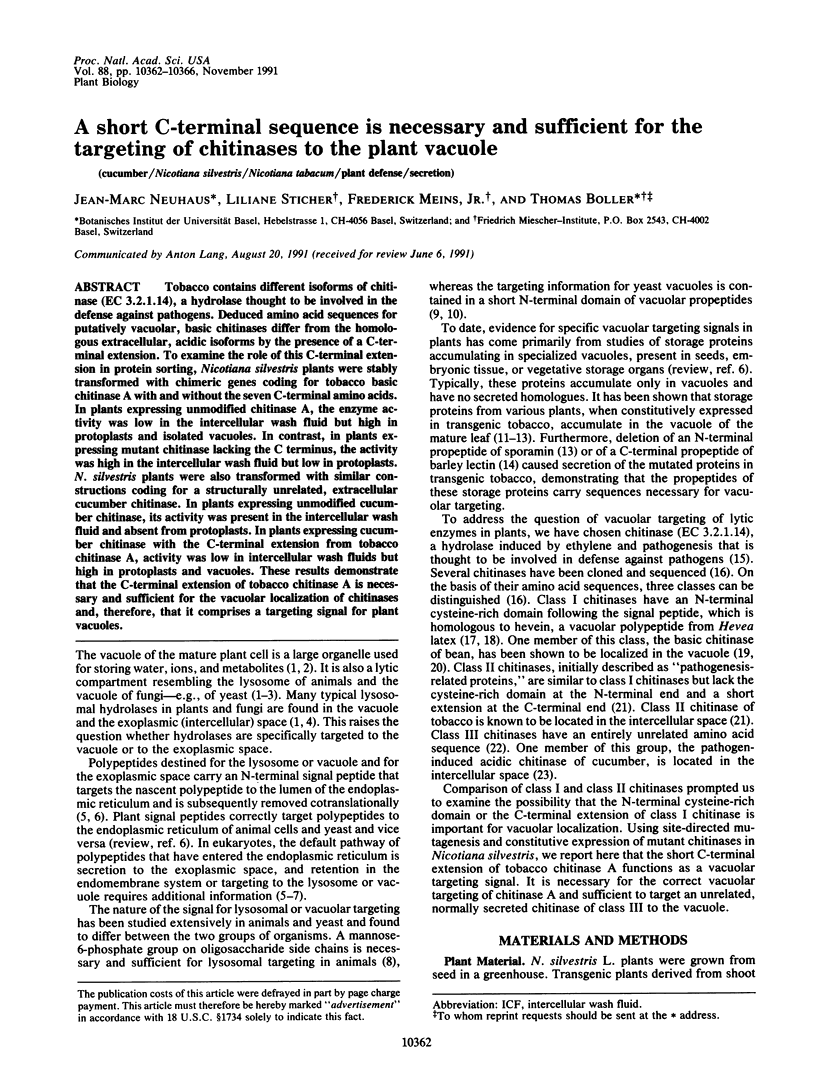
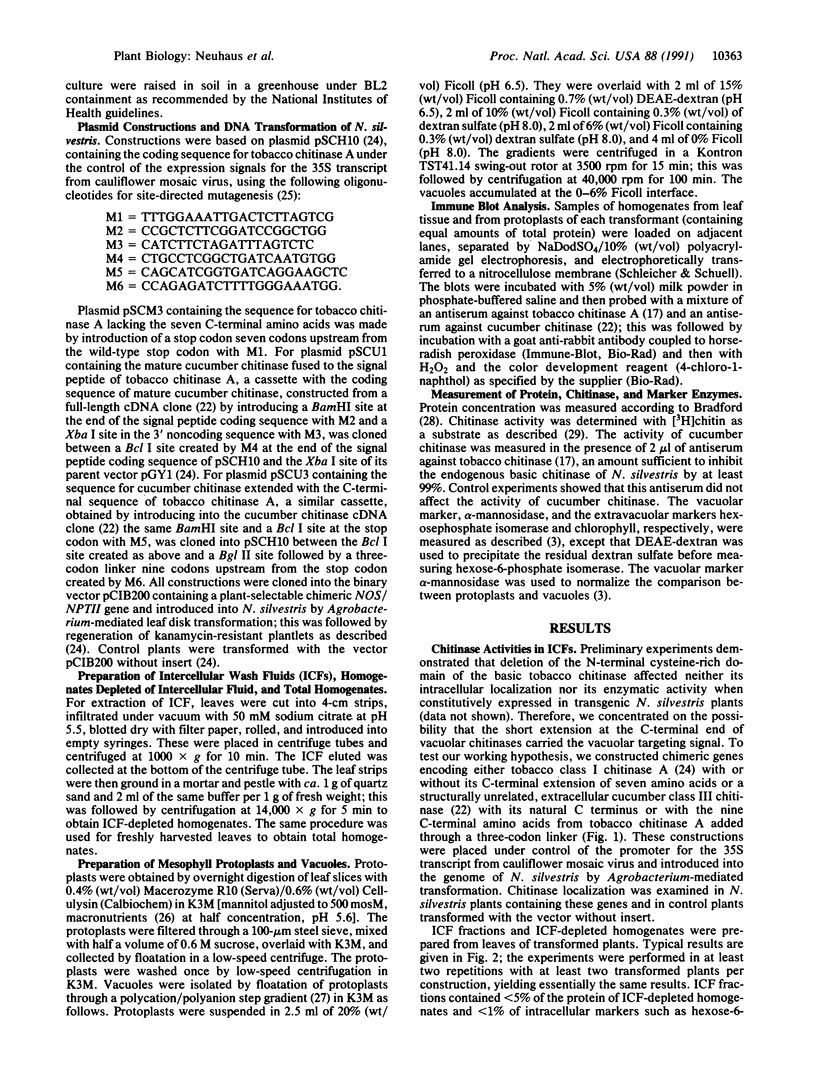
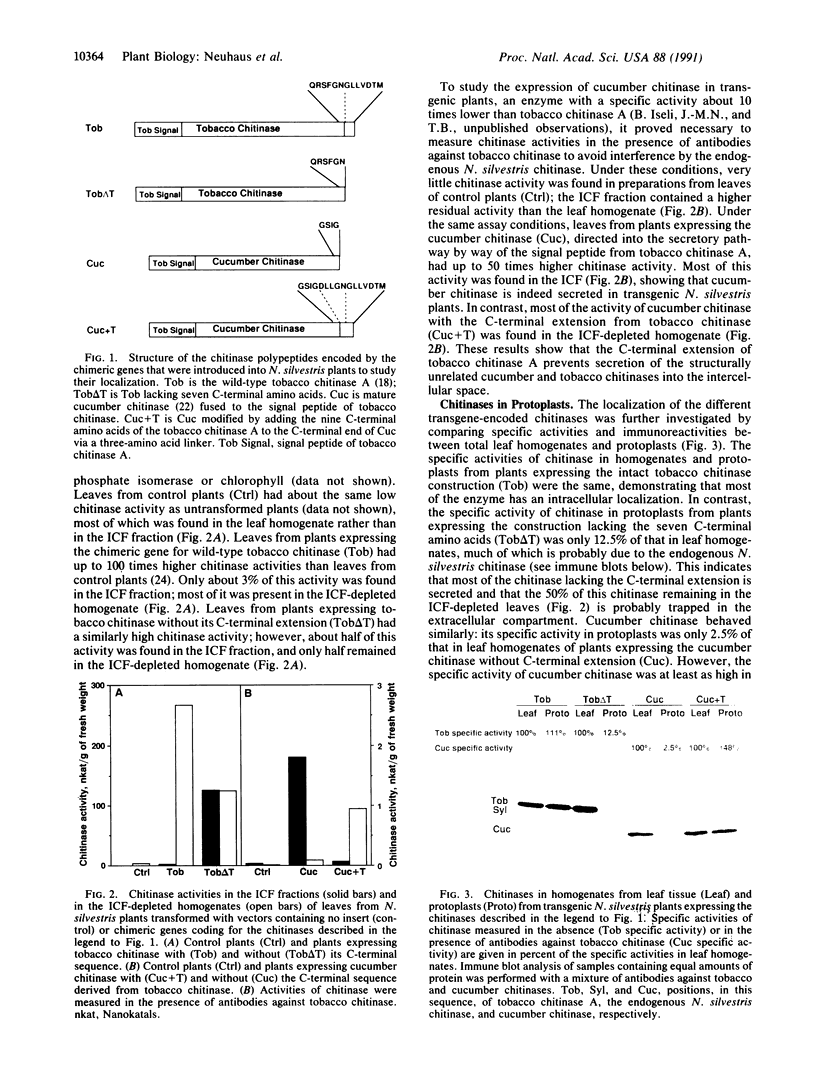
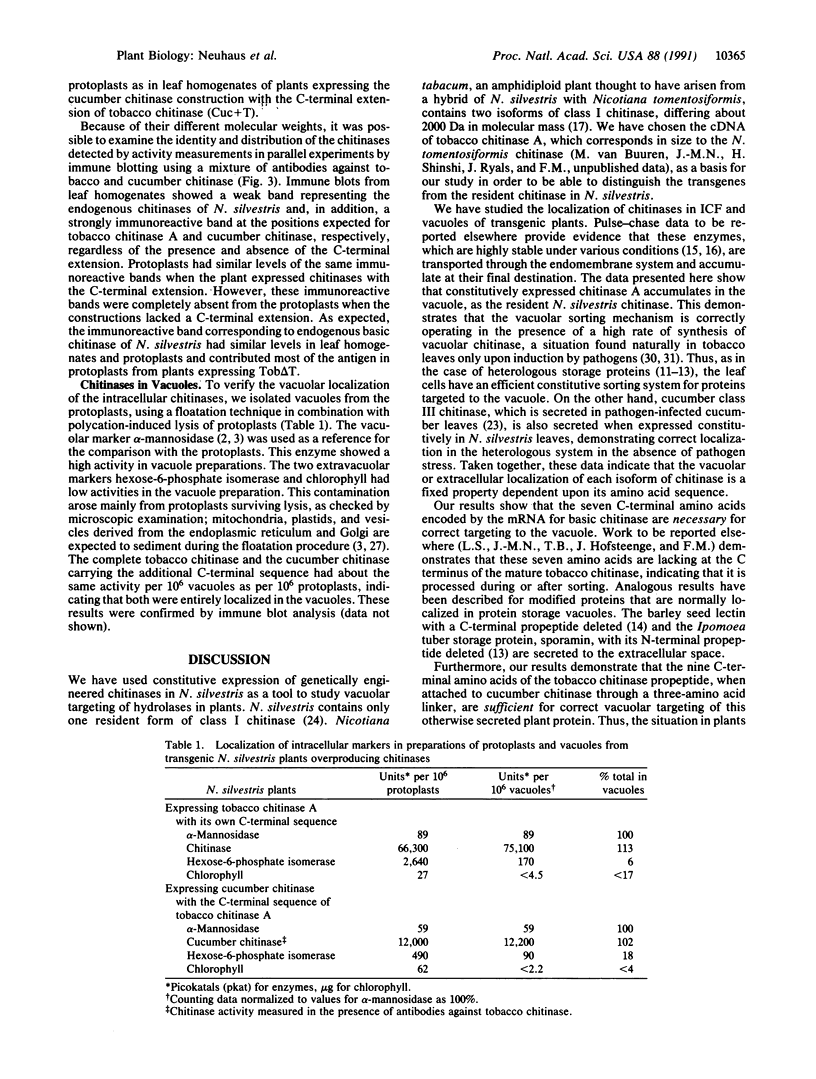
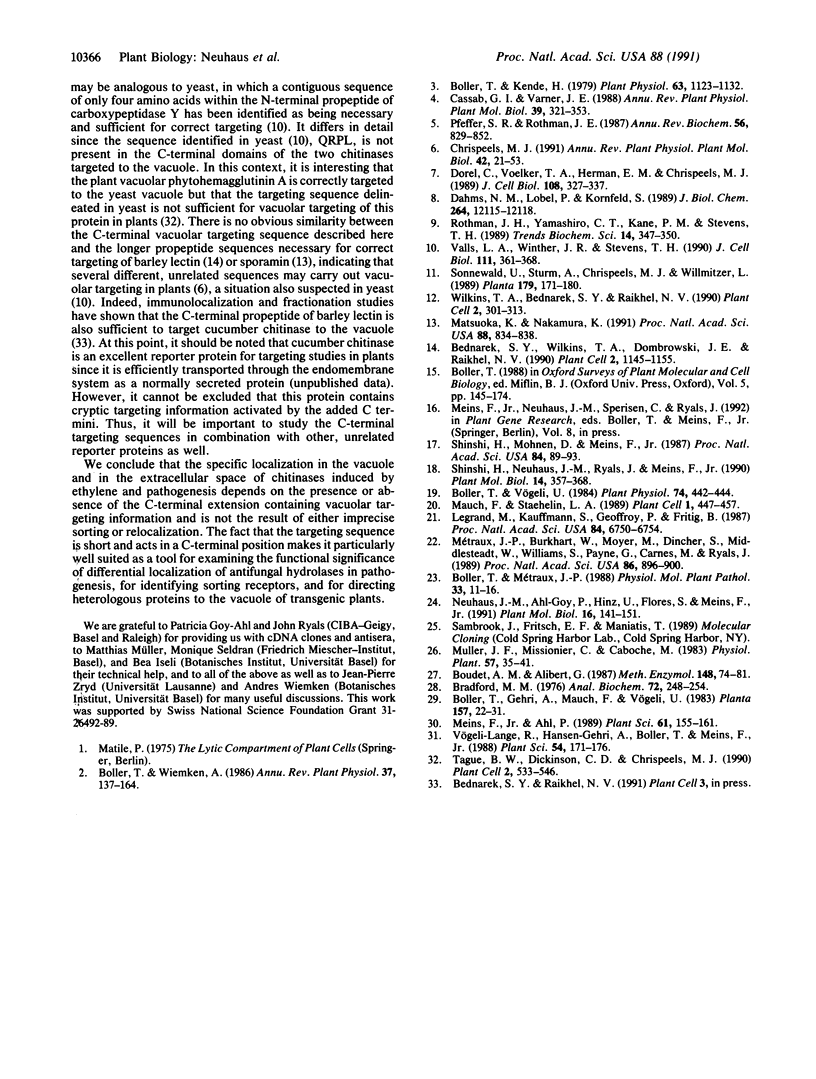
Images in this article
Selected References
These references are in PubMed. This may not be the complete list of references from this article.
- Bednarek S. Y., Wilkins T. A., Dombrowski J. E., Raikhel N. V. A carboxyl-terminal propeptide is necessary for proper sorting of barley lectin to vacuoles of tobacco. Plant Cell. 1990 Dec;2(12):1145–1155. doi: 10.1105/tpc.2.12.1145. [DOI] [PMC free article] [PubMed] [Google Scholar]
- Boller T., Kende H. Hydrolytic enzymes in the central vacuole of plant cells. Plant Physiol. 1979 Jun;63(6):1123–1132. doi: 10.1104/pp.63.6.1123. [DOI] [PMC free article] [PubMed] [Google Scholar]
- Boller T., Vögeli U. Vacuolar localization of ethylene-induced chitinase in bean leaves. Plant Physiol. 1984 Feb;74(2):442–444. doi: 10.1104/pp.74.2.442. [DOI] [PMC free article] [PubMed] [Google Scholar]
- Bradford M. M. A rapid and sensitive method for the quantitation of microgram quantities of protein utilizing the principle of protein-dye binding. Anal Biochem. 1976 May 7;72:248–254. doi: 10.1016/0003-2697(76)90527-3. [DOI] [PubMed] [Google Scholar]
- Dahms N. M., Lobel P., Kornfeld S. Mannose 6-phosphate receptors and lysosomal enzyme targeting. J Biol Chem. 1989 Jul 25;264(21):12115–12118. [PubMed] [Google Scholar]
- Dorel C., Voelker T. A., Herman E. M., Chrispeels M. J. Transport of proteins to the plant vacuole is not by bulk flow through the secretory system, and requires positive sorting information. J Cell Biol. 1989 Feb;108(2):327–337. doi: 10.1083/jcb.108.2.327. [DOI] [PMC free article] [PubMed] [Google Scholar]
- Legrand M., Kauffmann S., Geoffroy P., Fritig B. Biological function of pathogenesis-related proteins: Four tobacco pathogenesis-related proteins are chitinases. Proc Natl Acad Sci U S A. 1987 Oct;84(19):6750–6754. doi: 10.1073/pnas.84.19.6750. [DOI] [PMC free article] [PubMed] [Google Scholar]
- Matsuoka K., Nakamura K. Propeptide of a precursor to a plant vacuolar protein required for vacuolar targeting. Proc Natl Acad Sci U S A. 1991 Feb 1;88(3):834–838. doi: 10.1073/pnas.88.3.834. [DOI] [PMC free article] [PubMed] [Google Scholar]
- Mauch F., Staehelin L. A. Functional Implications of the Subcellular Localization of Ethylene-Induced Chitinase and [beta]-1,3-Glucanase in Bean Leaves. Plant Cell. 1989 Apr;1(4):447–457. doi: 10.1105/tpc.1.4.447. [DOI] [PMC free article] [PubMed] [Google Scholar]
- Metraux J. P., Burkhart W., Moyer M., Dincher S., Middlesteadt W., Williams S., Payne G., Carnes M., Ryals J. Isolation of a complementary DNA encoding a chitinase with structural homology to a bifunctional lysozyme/chitinase. Proc Natl Acad Sci U S A. 1989 Feb;86(3):896–900. doi: 10.1073/pnas.86.3.896. [DOI] [PMC free article] [PubMed] [Google Scholar]
- Neuhaus J. M., Ahl-Goy P., Hinz U., Flores S., Meins F., Jr High-level expression of a tobacco chitinase gene in Nicotiana sylvestris. Susceptibility of transgenic plants to Cercospora nicotianae infection. Plant Mol Biol. 1991 Jan;16(1):141–151. doi: 10.1007/BF00017924. [DOI] [PubMed] [Google Scholar]
- Pfeffer S. R., Rothman J. E. Biosynthetic protein transport and sorting by the endoplasmic reticulum and Golgi. Annu Rev Biochem. 1987;56:829–852. doi: 10.1146/annurev.bi.56.070187.004145. [DOI] [PubMed] [Google Scholar]
- Rothman J. H., Yamashiro C. T., Kane P. M., Stevens T. H. Protein targeting to the yeast vacuole. Trends Biochem Sci. 1989 Aug;14(8):347–350. doi: 10.1016/0968-0004(89)90170-9. [DOI] [PubMed] [Google Scholar]
- Shinshi H., Mohnen D., Meins F. Regulation of a plant pathogenesis-related enzyme: Inhibition of chitinase and chitinase mRNA accumulation in cultured tobacco tissues by auxin and cytokinin. Proc Natl Acad Sci U S A. 1987 Jan;84(1):89–93. doi: 10.1073/pnas.84.1.89. [DOI] [PMC free article] [PubMed] [Google Scholar]
- Shinshi H., Neuhas J. M., Ryals J., Meins F., Jr Structure of a tobacco endochitinase gene: evidence that different chitinase genes can arise by transposition of sequences encoding a cysteine-rich domain. Plant Mol Biol. 1990 Mar;14(3):357–368. doi: 10.1007/BF00028772. [DOI] [PubMed] [Google Scholar]
- Tague B. W., Dickinson C. D., Chrispeels M. J. A short domain of the plant vacuolar protein phytohemagglutinin targets invertase to the yeast vacuole. Plant Cell. 1990 Jun;2(6):533–546. doi: 10.1105/tpc.2.6.533. [DOI] [PMC free article] [PubMed] [Google Scholar]
- Valls L. A., Winther J. R., Stevens T. H. Yeast carboxypeptidase Y vacuolar targeting signal is defined by four propeptide amino acids. J Cell Biol. 1990 Aug;111(2):361–368. doi: 10.1083/jcb.111.2.361. [DOI] [PMC free article] [PubMed] [Google Scholar]
- Wilkins T. A., Bednarek S. Y., Raikhel N. V. Role of propeptide glycan in post-translational processing and transport of barley lectin to vacuoles in transgenic tobacco. Plant Cell. 1990 Apr;2(4):301–313. doi: 10.1105/tpc.2.4.301. [DOI] [PMC free article] [PubMed] [Google Scholar]



